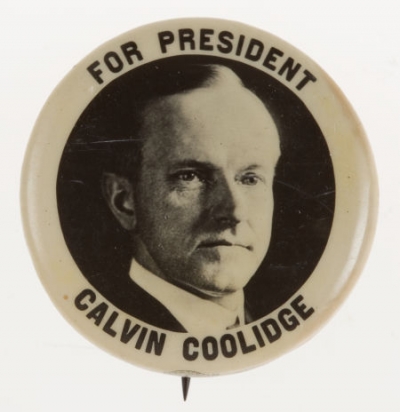
“The business of America is…business.”
First, an apology. We ran a paid post last week. It was garbage, but again, they threw money at us. We don’t normally run paid posts, not just because they’re awful but because they’re so dissimilar from the rest of our posts. Still, they’re called “paid” for a reason. Diminish the integrity of the site for a day so we can cash in? Absolutely. The problem is that this one turned out to be an unpaid post. Halifax Bank never squared up with us, so we yanked their post and will never acknowledge their existence again. They and the rest of Bank of Scotland’s subsidiaries can all go to hell.
Oh yeah, our topic: He rendered unto the states what was the states’, and disagreed with international alliances on principle. For our money, he was America’s greatest president. He didn’t serve all that long ago, either – within the lifetime of several people reading this.
Nor was he a plutocrat. Under his administration, almost all income taxes in the nation were paid by the richest 2% of the citizenry. Those taxes were modest, too. The remaining 98% paid nothing. He retired one-quarter of the federal debt, an idea so preposterous in 2012 that neither candidate even makes an offhand promise to do it. He had about as tiny an ego as you can have and still be President. He would have hated the idea of his face being turned into iconography. Most impressively, he stood down in 1928 even though he almost certainly would have won. Yes, there was a time in American history when substance alone could get a man elected President. How ironic, especially in this, the Age of Irony.
Alas, Calvin Coolidge isn’t on the ballot this time. Nor is anyone similar. Fortunately, we have another edition of the Carnival of Wealth to tide you over until it happens again. Personal finance blog posts from tout le monde. Enjoy:
John Kiernan at Card Hub gets top billing this week for banging the same drum that we’ve been banging since Day 1 here at CYC: financial education for college students. Every year our institutes of higher learning crank out graduates who can analyze ecosystems, read poetry, and diagnose schizophrenia. Yet balancing a checkbook and negotiating a car purchase don’t fit in the curriculum, for some reason. John shows us several schools (Texas Tech, Duke etc.) that are teaching kids something eminently practical. And if this isn’t an appropriate place to place a link to The Greatest Personal Finance Book Ever Written, nowhere is.
You mean there’s yet another woman who blogs about how she’s planning to spend far more time paying off her student loans than she did incurring them? We thought we’d already seen all 349,221,270 of said bloggers, but apparently one slipped through the cracks. Kerry Lambeth at Frugal City Girl “works in money journalism” and loves to give monthly updates on her debt. She also talks about her expensive purchases – a $700 camera here, a $40 dress there (“to bridge the gap between home wear and pyjamas”), and oh God how to readers continue to digest this stuff? Perhaps it’s the same reason why every drama on television is about lawyers, cops, or lawyers and cops. People say they crave originality. People are freaking liars. The more repetitive and unchallenging something is, the more popular it is. Personal finance blogs are no exception.
Oh yeah, her submission. Ms. Lambeth went to Hampton Court Palace and saw how Henry VIII lived when he wasn’t decapitating his wives or his Catholic advisors. She also took pictures. This has nothing to do with personal finance, but she attempted to tie things together at the end when she pointed out that unhappy people who have the wherewithal to do so (like the King, presumably) spend a lot of money. So do happy rich people, but that doesn’t reinforce Ms. Lambeth’s point. A couple of pieces of self-justification, some sympathetic comments from like-minded debtors, and there’s your blog post. So easy a child can do it.
Help! Andrew at 101 Centavos to the rescue, with a fantastic title: Investing In Fatties, Or: How I Learned to Stop Worrying and Love Obamacare (Part 1). Andrew agrees that ordering citizens to buy a service – and punishing them if they don’t – is what totalitarian governments do. The United States of the 21st century is such an animal, like it or not. Andrew’s making lemonade of the situation, figuring that at the very least he should be able to profit off the companies who will now be receiving the business of fat people who’d otherwise have been deemed uninsurable.
Try not to read the comments on this post, most of which repeat the old canards about how fat people are that way because the American “food system” (whatever that means) denies them healthy food and forces them to buy cheap, fattening food. We’ve proven that that’s a stinking lie, but most people don’t like even entertaining the notion of having their assumptions challenged and their minds changed. Just like most people aren’t, or don’t want to be, financially successful.
The relentless zealots at Becoming Your Own Bank have submitted 4 consecutive weeks now, even though we poke fun at their core business of whole life insurance every single time (and panned a book they wrote on the same topic.) It’s good to know that some of our submitters are too busy charging people for a noxious financial product to read our site. This week, BYOB confuses investing with insuring, yet again. Shall we pencil them in for next week, too? We have a feeling we’ll need to.
It seems that several collection agencies were making debtors feel bad. From Odysseas Papadimitriou at Wallet Blog, news that the Consumer Financial Protection Bureau is now enforcing politeness. Now, the collection agency that got involved because you refused to pay your credit card bill on time has to be nice to you while trying to collect what you owe. How long before a particularly sensitive debtor ends up suing a collection agency for shattering her self-esteem, and winning? Folks, whatever you do, don’t pay your bills on time. Keep ringing up purchases you can’t afford. It’s the sellers’ fault for making you want it so much.
You don’t have to live in the UK to appreciate this tip from TaxFix. You merely need to have done business there. Get your paperwork in by the end of the month to avoid penalties, and try to ignore that the hammer and open-end wrench (or as the Brits say, “spanner”) in TaxFix’s logo looks like it belongs on the Soviet flag.
Nobody knows the Canadian energy sector like Mich at Beating the Index. This week he avails us of Argent Energy Trust, a trust which though based in Canada operates oil fields in Texas and Oklahoma.
Something called Trading Academy debuts this week. This is one of those blog posts that illustrates the Wadsworth Constant. Here’s the entire post, reduced to 2 sentences: A lot of mutual funds’ fiscal years are ending right about now, therefore so is the annual practice of selling off to mitigate tax losses. Thus the S&P 500 usually rises this time of year.
From Ken Faulkenberry at AAAMP Blog, a breakdown of tactical asset allocation. Oh, relax. It’s more interesting than it sounds. What Ken espouses is that you should use despondency and other seemingly negative emotions to your advantage. Ride the trough of the wave, not the crest. Or as Ken puts it,
[L]ook for opportunities in assets that are experiencing extreme pessimism, and look to take profits in assets that are experiencing a buying euphoria.
What’s better than a 30-year obligation to a lending institution that can take your house if you don’t make your payments on time? 2 of them! From Charles Davis at Wallet Hub, what to watch for before getting a straight-up 2nd mortgage or a home equity line of credit. If you don’t know what the difference is, you need to read this.
(Sophomoric post about debt. We would have lambasted it, but the submitter is a retired United States Marine. So we’ll do him the courtesy of just not running it.)
The mysterious Dividend Growth Investor makes his weekly appearance, this time entertaining the argument that dividends might be worthless. Why? Because on the ex dividend date, the stock usually falls in value by some amount approaching the size of the dividend. But of course, a dividend is tied to a company’s fundamentals. A stock price is just the consensus of a bunch of wildly divergent opinions that can have little to do with reality. See an argument created, rebutted and destroyed all in one post.
Free Money Finance says it makes sense to think of annuities as insurance. Which they are, if you’re worried about living to 110 and exhausting all your other assets. The author also links (in a non-reciprocal manner) to a website that sells annuities and looks like it was designed in 1998. We mention the site because it goes to great lengths not to disclose the interest rates it pays out at. Folks, if you’re doing business with someone and don’t know the terms, you deserve to lose everything.
John P. Schmoll runs Frugal Rules. Schmoll is German for “pouting”, and you should have seen the email he sent us after we ran his inaugural CoW post with commentary. This week John P. gives 4 tips for saving money on taxes. Cut your stock losses, give to charity, etc. Which is good advice all around. Now if we could only get him to hire an editor. (3 instances of “needs” as a noun, egregious use of the passive voice, and a glaring example of RAS Syndrome [IRA account]. Aside from that, great post.)
Thanks for coming. Check us out on Investopedia, too. We update this site daily, with new long posts every Wednesday and Friday. And a new CoW Monday. Take care.



